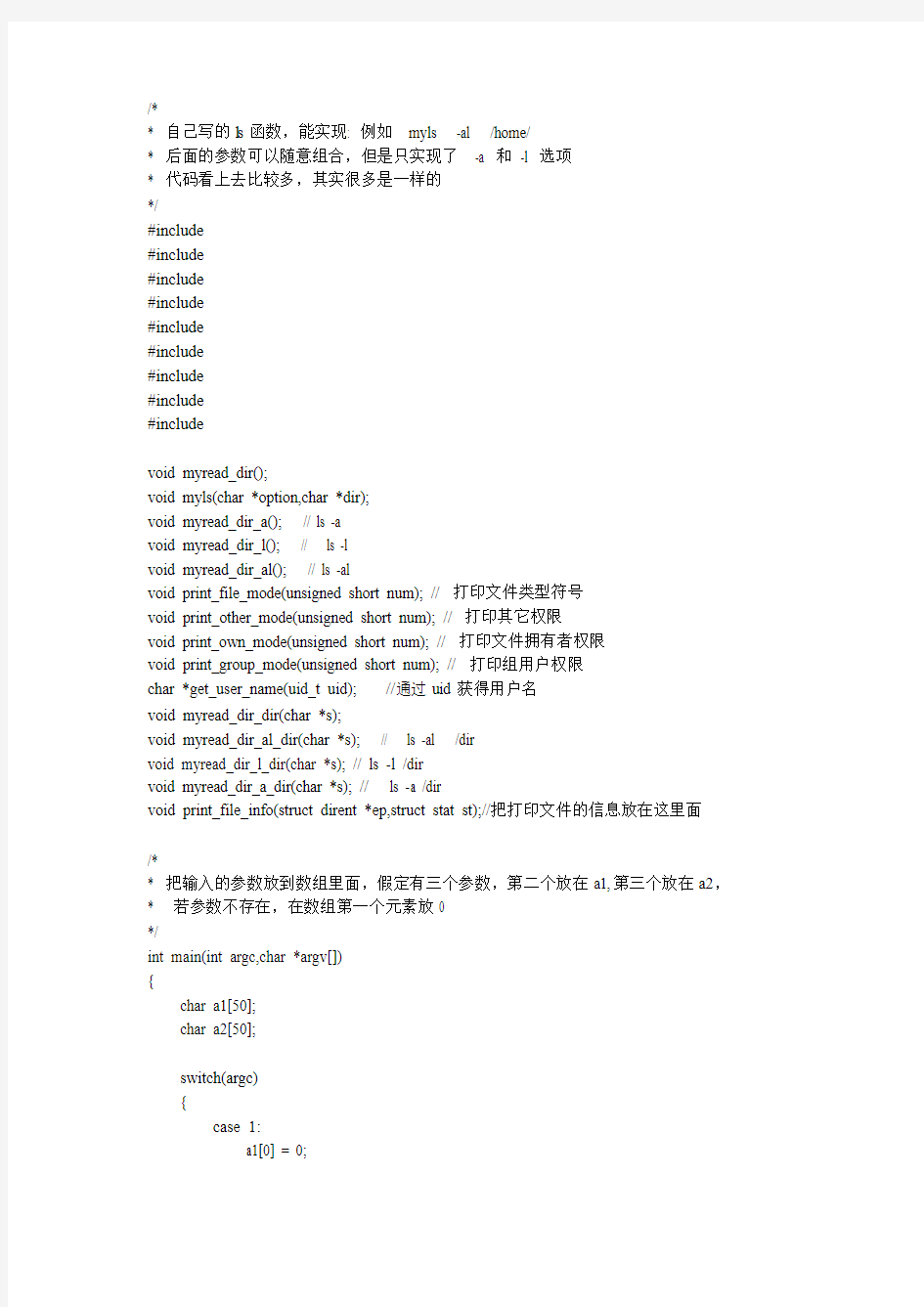myls


/*
* 自己写的l s函数,能实现: 例如myls -al /home/
* 后面的参数可以随意组合,但是只实现了-a 和-l 选项
* 代码看上去比较多,其实很多是一样的
*/
#include
#include
#include
#include
#include
#include
#include
#include
#include
void myread_dir();
void myls(char *option,char *dir);
void myread_dir_a(); // ls -a
void myread_dir_l(); // ls -l
void myread_dir_al(); // ls -al
void print_file_mode(unsigned short num); // 打印文件类型符号
void print_other_mode(unsigned short num); // 打印其它权限
void print_own_mode(unsigned short num); // 打印文件拥有者权限
void print_group_mode(unsigned short num); // 打印组用户权限
char *get_user_name(uid_t uid); //通过uid获得用户名
void myread_dir_dir(char *s);
void myread_dir_al_dir(char *s); // ls -al /dir
void myread_dir_l_dir(char *s); // ls -l /dir
void myread_dir_a_dir(char *s); // ls -a /dir
void print_file_info(struct dirent *ep,struct stat st);//把打印文件的信息放在这里面
/*
* 把输入的参数放到数组里面,假定有三个参数,第二个放在a1,第三个放在a2,* 若参数不存在,在数组第一个元素放0
*/
int main(int argc,char *argv[])
{
char a1[50];
char a2[50];
switch(argc)
{
case 1:
a1[0] = 0;
a2[0] = 0;
break;
case 2:
if(argv[1][0] == '-')
{
strncpy(a1,argv[1],strlen(argv[1]));
a2[0] = 0;
}
else
{
a1[0] = 0;
strcpy(a2,argv[1]);
}
break;
case 3:
strcpy(a1,argv[1]);
strcpy(a2,argv[2]);
break;
default:
if(argc > 3)
printf("there are too many arguments!\n");
break;
}
myls(a1,a2);
return 0;
}
/*
*根据参数情况,把各种组合情况考虑进来,如ls -a, ls -l , ls /dir , ls ,等多种情况*/
void myls( char *option,char *dir)
{
char *po = option;
char *pd = dir;
if(po[0] == 0 && pd[0] == 0)//不带参数(第一个不算)
{
myread_dir();
}
else if(po[0] != 0 && pd[0] == 0) //带一个参数,我们还要考虑,到底是哪一个{
if((strlen(po) > 3) && (strlen(po) < 2))
{
printf("The opition is wrong!\n");
exit(-1);
}
else
{
if((strchr(po,'a') != NULL) && (strchr(po,'l') == NULL))/* -a */
{
myread_dir_a();
}
else if((strchr(po,'a') == NULL) && (strchr(po,'l') != NULL))/* -l */
{
myread_dir_l();
}
else if((strchr(po,'a') != NULL) && (strchr(po,'l') != NULL))/* -al */
{
myread_dir_al();
}
}
}
else if(po[0] == 0 && pd[0] != 0)
{
myread_dir_dir(pd);
}
else if(po[0] != 0 && pd[0] != 0) //带二个参数,这里也有多种情况
{
if(strchr(po,'a') != NULL && strchr(po,'l') == NULL)
{
myread_dir_a_dir(pd);
}
else if(strchr(po,'a') == NULL && strchr(po,'l') != NULL)
{
myread_dir_l_dir(pd);
}
else if(strchr(po,'a') != NULL && strchr(po,'l') != NULL)
{
myread_dir_al_dir(pd);
}
}
}
/*读当前目录*/
/* eg: ls ./ */
void myread_dir()
{
DIR *dp;
struct dirent *ep;
dp = opendir("./");
if(dp != NULL)
{
while((ep = readdir(dp)))
{
if(ep->d_name[0] !='.')
printf("%s ",ep->d_name);
}
putchar('\n');
}
closedir(dp);
}
/*读指定文件目录*/
/*eg: ls /dir */
void myread_dir_dir(char *s)
{
DIR *dp;
struct dirent *ep;
int count = 0;
dp = opendir(s);
if(dp == NULL)
{
perror("open failed");
printf("%s\n",s);
}
if(dp != NULL)
{
while((ep = readdir(dp)))
{
if(ep->d_name[0] !='.')
{
printf("%-20s",ep->d_name);
count++;
}
if(count == 5)
{
putchar('\n');
count = 0;
}
putchar('\n');
}
closedir(dp);
}
/*读目录下所有文件,包括隐藏文件*/
/*eg: ls -a ./ */
void myread_dir_a()
{
DIR *dp;
struct dirent *ep;
dp = opendir("./");
if(dp != NULL)
{
while((ep = readdir(dp)))
{
printf("%s ",ep->d_name);
}
putchar('\n');
}
closedir(dp);
}
/* myls -a /home/ */
/*显示指定目录下的全部文件*/
void myread_dir_a_dir(char *s)
{
DIR *dp;
struct dirent *ep;
int count = 0;
dp = opendir(s);
if(dp != NULL)
{
while((ep = readdir(dp)))
{
printf("%-25s",ep->d_name);
count++;
if(count == 4)
{
putchar('\n');
count = 0;
}
putchar('\n');
}
closedir(dp);
}
/* myls -al /home/ */
/*打印目录信息,可带参数*/
void myread_dir_al_dir(char *s)
{
DIR *dp;
struct dirent *ep;
struct stat st;
dp = opendir(s);
if(dp != NULL)
{
while((ep = readdir(dp)))
{
char *str = malloc(50);
strcpy(str,s);
strcat(str,ep->d_name);/*把s加到文件名的前面去*/
if(stat(str,&st) != -1)
{
print_file_info(ep,st);
}
else
{
printf("stat failed!\n");
}
free(str);
}
}
closedir(dp);
}
/*myls -l /home/ */
/*显示指定目录下的全部文件*/
void myread_dir_l_dir(char *s)
{
DIR *dp;
struct dirent *ep;
struct stat st;
dp = opendir(s);
//printf("%s\n",s);
if(dp != NULL)
{
while((ep = readdir(dp)))
{
if(ep->d_name[0] != '.')
{
char *str = malloc(50);
strcpy(str,s);
strcat(str,ep->d_name);/*把s加到文件名的前面去*/
if(stat(str,&st) != -1)
{
print_file_info(ep,st);
}
else
{
printf("stat failed!\n");
}
free(str);
}
}
}
closedir(dp);
}
/* ls -al ./ */
void myread_dir_al()
{
DIR *dp;
struct dirent *ep;
struct stat st;
dp = opendir("./");
if(dp != NULL)
{
while((ep = readdir(dp)))
{
if(stat(ep->d_name,&st) != -1)
{
print_file_info(ep,st);
}
}
}
closedir(dp);
}
/*把打印全放在这个函数中了*/
void print_file_info(struct dirent *ep,struct stat st) {
unsigned short num;
num = st.st_mode & S_IFMT;
print_file_mode(num);/*打印文件类型*/
num = st.st_mode & S_IRWXU;
print_own_mode(num);/*打印文件拥有者权限*/
num = st.st_mode & S_IRWXG;
print_group_mode(num);/*打印同组用户权限*/
num = st.st_mode & S_IRWXO;
print_other_mode(num);/*打印其它人权限*/
printf(" ");/*分隔符*/
printf("%3u",st.st_nlink);/*打印文件链接数*/
printf(" ");/*分隔符*/
printf("%s",get_user_name(st.st_uid));
printf(" ");
printf("%s",get_user_name(st.st_gid));
printf(" ");/*分隔符*/
printf("%ld",st.st_blksize);
printf(" ");/*分隔符*/
char str[50];
strcpy(str,ctime(&(st.st_mtime)));
str[strlen(str)-1] = ' ';
printf("%s",str);
printf(" ");/*分隔符*/
printf("%s",ep->d_name);
putchar('\n');
}
/*eg: ls -l ./ */
void myread_dir_l()
{
DIR *dp;
struct dirent *ep;
struct stat st;
dp = opendir("./");
if(dp != NULL)
{
while((ep = readdir(dp)))
{
if(ep->d_name[0] != '.')
{
if(stat(ep->d_name,&st) != -1)
{
print_file_info(ep,st);
}
}
}
}
closedir(dp);
}
/*打印文件类型*/
void print_file_mode(unsigned short num)
{
switch(num)
{
case S_IFSOCK:
printf("s");
break;
case S_IFLNK:
printf("l");
break;
case S_IFREG:
printf("-");
break;
case S_IFBLK:
printf("b");
break;
case S_IFDIR:
printf("d");
break;
case S_IFCHR:
printf("c");
break;
case S_IFIFO:
printf("f");
break;
default:
break;
}
}
/*打印用户权限*/
void print_own_mode(unsigned short num) {
unsigned short temp;
temp = num;
if((num & S_IWUSR) == S_IWUSR)
printf("w");
else
printf("-");
num = temp;
if((num & S_IRUSR) == S_IRUSR)
printf("r");
else
printf("-");
num =temp;
if((num & S_IXUSR) == S_IXUSR)
printf("x");
else
printf("-");
}
/*打印组用户权限*/
void print_group_mode(unsigned short num) {
unsigned short temp;
temp = num;
if((num & S_IWGRP) == S_IWGRP)
printf("w");
else
printf("-");
num = temp;
if((num & S_IRGRP) == S_IRGRP)
printf("r");
else
printf("-");
num = temp;
if((num & S_IXUSR) == S_IXUSR)
printf("x");
else
printf("-");
}
/*打印其它用户权限*/
void print_other_mode(unsigned short num)
{
unsigned short temp;
temp = num;
if((num & S_IWOTH) == S_IWOTH)
printf("w");
else
printf("-");
num =temp;
if((num & S_IROTH) == S_IROTH)
printf("r");
else
printf("-");
num = temp;
if((num & S_IXOTH) == S_IXOTH)
printf("x");
else
printf("-");
}
/*这里放了一个很重要的错误,关于指针的,后来改过来了*/ char * get_user_name(uid_t uid)/*通过uid得到用户名*/
{
struct passwd *pn;// = &pw;
pn = getpwuid(uid);
return pn->pw_name;
}
